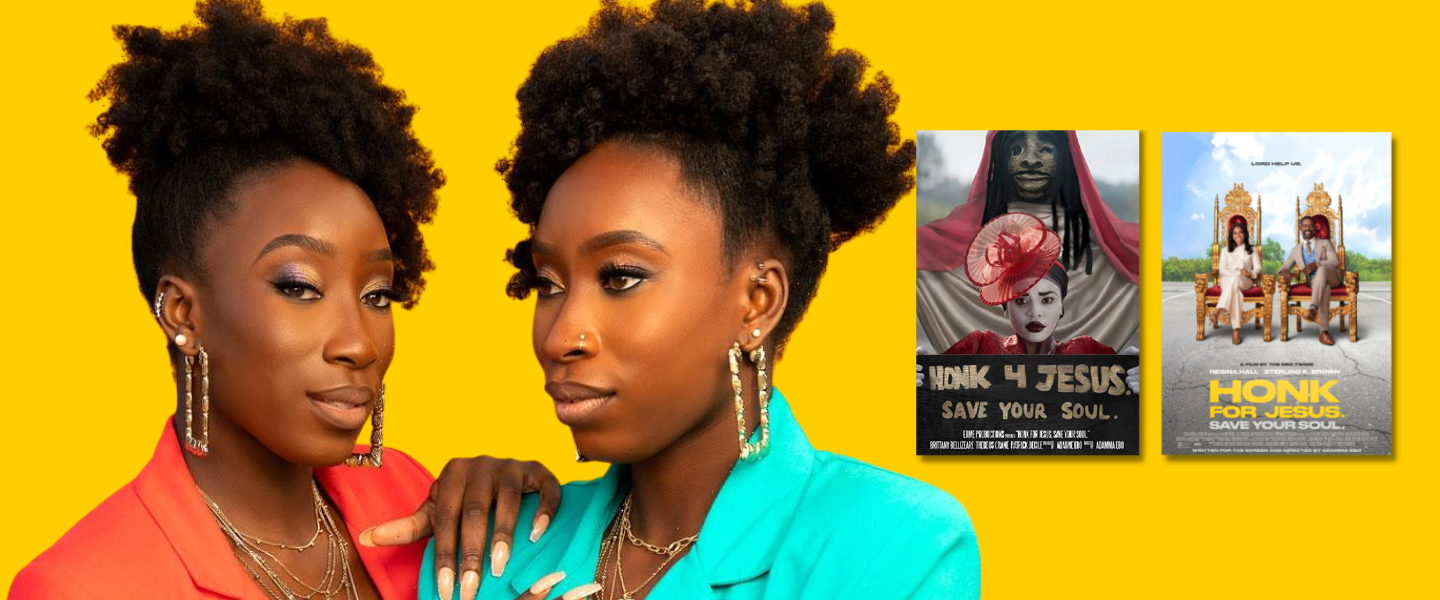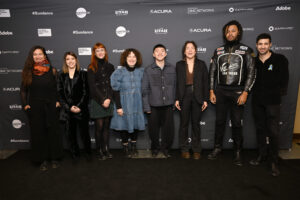By Stephanie Ornelas
When a short is expanded and reimagined into a feature film, it allows audiences to dive deeper into a story that captivated them in just a short amount of time. Many viewers might not even be aware that some of the most talked-about feature films in recent years started out as shorts, such as Bottle Rocket, Emergency, Saw, and Marcel the Shell with Shoes On (just to name a few).
As many filmmakers can attest, reshaping a short into a feature can be complex, and the process is different for every artist — just ask Adamma and Adanne Ebo, twin sisters and the creators of Honk for Jesus. Save Your Soul. Their feature, which was supported through Sundance Institute’s 2019 Screenwriters Intensive, is partly filmed in faux-documentary style and follows the first lady (Regina Hall) of a prominent Southern Baptist megachurch as she attempts to help her pastor-husband (Sterling K. Brown) rebuild their congregation after a huge scandal. The film joined the ever growing list of movies that leaped from short to feature when it premiered at the 2022 Sundance Film Festival.
“I highly recommend all the [Sundance] Labs. I did the intensive with Honk [for Jesus. Save Your Soul.], and we also did the Episodic Lab together with one of our TV projects,” says writer-director Adamma Ebo. “They take care of you at Sundance. They’re invested in your career throughout. We wouldn’t be full-time creatives without them. The Sundance Screenwriting Intensive was as described: intense. But it was transformative. The advisors helped take my screenplay to the next level, but one of the most momentous things about it was we got linked up with Daniel Kaluuya, also a Sundance alum.”
Kaluuya’s production company, 59%, would eventually produce the feature, his first feature film as a producer. Shortly after its world premiere at the 2022 Sundance Film Festival, the film was acquired by Focus Features, Peacock, and Jordan Peele’s Monkeypaw Productions.
The Ebo sisters learned a lot when they expanded their short film into a critically acclaimed feature, and last month, the twins shared their journey with Sundance Collab members as they guided participants through the online Master Class: Transforming Your Short Film to Your First Feature with Adamma and Adanne Ebo. During the interactive class, they talk about using their short as a proof-of-concept for a feature-length project, and they share lessons they learned along the way as they found financing and entered the film festival circuit — and in true twin fashion, they also finished each other’s sentences.

Comparing clips from both versions of their film, Adamma and Adanne examine the actor portrayals and the themes they aimed to explore throughout the short that carried into the feature. Below are just a few takeaways from the class:
Know the core of your story
“I went into the short film already knowing the core of the story, and I knew that it was going to be a proof-of-concept for a larger feature,” says Adamma. “I was doing two things at once — I wanted [the film] to feel like a complete story, but at the same time, I wanted audiences to feel like, ‘There’s so much more that I could learn about this world and enjoy about this world. There’s so much more that I could get from these characters.’”
She continues, “If I could develop this into something larger and completely plausible for producers and financiers, it wouldn’t be hard for them to understand how this could be a larger world. And we knew that we would need to expand the world and the characters for the feature. But this was the base. We did that by using scenes and moments directly from the short. Basically everything that’s in the short is in the feature. And what I realized while writing the feature is that in expanding this world, everything that happened in the short is essentially the climax of the story.”
Examine the indie-film and festival spaces…
“After we produced the short, the first thing that we were really intent on was getting it out there,” explains Adanne Ebo, who produced the film. “And the best way for us to get it out there was to do the festival circuit and apply to a bunch of festivals, which we did, and the short had a pretty successful run. I made an entire grid with all the festival names, the deadlines, and made sure that we hit mostly early deadlines.”
“Early deadlines for festivals make a difference,” chimes in Adamma.

“And we targeted specific festivals. If you do your research and are more knowledgeable about the indie-film space and the festival space, you know certain festivals kind of lean in certain directions as far as types of film,” Adanne advises.
… Then be strategic with film festivals
“Of course we applied to other big ones like Sundance, South by [Southwest]. We targeted the Oscar-qualifying ones and the Southern ones because we knew it would probably play well in the South,” says Adanne. “And we did the Atlanta Film Festival, which is Oscar-qualifying. We did Palm Springs [International Film Festival], LA Shorts [International Film Festival], the BronzeLens [Film Festival].”
“Also ones that leaned weird because the tone of the movie is very specific, and we knew that it doesn’t check just one box,” explains Adamma.
And it was this strategy that led their short film to stream on Issa Rae’s Short Film Sundays on YouTube.
“We got a lot of positive feedback from the festivals, and we still had the goal of making [the short] into a feature, but we weren’t exactly sure what that next step would be,” says Adanne. “But something that was helpful during the festival run was that Issa Rae and one of her executives saw the short at BlackStar Film Festival, and she loved it. And so Issa reached out to our reps.”
“After it went on Issa’s YouTube, we found an even bigger audience. It was something that we could point to for producers and financiers. Because people would be in the comments saying, ‘We want to know more. We want to be with these characters more,’” Adanne explains.
Understand the importance of casting
A common question from viewers of the Master Class was how the Ebo sisters navigated casting for the feature and if that was a conversation they had with the cast members of the original short.
“We didn’t have the conversation with Brittany (Brittany Bellizeare) and Theo (Theodus Crane), the leads of the short, until making the feature became more of a real conversation,” Adanne explains. “They’re actors. They understood. Our inclination would have been to use them because they’re fantastic, and we got compliments on their performance. Sterling and Regina really liked the writing and they were like, ‘The direction seems cool, but the actors really pulled us into these characters.’”

Adanne continues, “[Hall and Brown] both watched the short before they committed to the feature. They were like, ‘Where did you find these actors? They did an amazing job.’ So, I think that was our inclination, that we wanted to use the same actors, but as we got into the conversations with Daniel [Kaluuya] and then potential financiers, it became evident that that’s kind of how the business works. You will tend to get more money and more exposure if you have name talent attached because it kind of justifies a larger budget. They think if you have name talent attached, people are going to be more inclined to see it, which is not untrue. We didn’t have those conversations too early on. It was really when we met Daniel. And [Bellizeare and Crane] were completely understanding. They were still very supportive of us, and we’re very supportive of them.”
Do your research on financiers
The Ebo sisters learned that having financiers who are also producers can be an extreme challenge. “It gets really tricky when your producers are also handling the money,” says Adanne.
Adamma explains how, at one point, she had to speak up, as there were too many cooks in the kitchen.
“They were on set, which got to be a little bit of an issue that we had to address. After the first day of production, I said, ‘You hired me to direct my movie, so let me do it.’ It was a delicate tightrope of a balance that we had to figure out when the people who make creative decisions also hold the purse strings.”
Nevertheless, they were thrilled to find a financier who could help transform their short into their first feature film, and they explain how they absolutely benefitted from working with an agency.
“Because I worked in TV and film financing and sales, I already had connections with a lot of financiers,” says Adanne. “But also, before we made the film, we already had representation, which is extremely helpful. We’re repped at UTA [Independent Film Group], and UTA has an indie-film sales and financing division. Their sole purpose is to help their clients get money to make their films and eventually gain distribution. We ended up finding Pinky Promise Films through UTA.”
“This part can be tricky, especially if you don’t have connections in that world,” admits Adanne, “But finding out who finances films is not a hard thing to do. I would recommend doing your research on financiers to see what type of films they tend to finance. Go on their websites. Slide into their DMs. There are ways to reach out if you don’t have representation, especially today.”
That’s certainly not all the Ebo sisters had to say about their journey to transform their short into their first feature film. The three-hour Master Class goes far beyond the five tips listed above. Sign up for a Sundance Collab Membership to access the full recording and get more insight from Adamma and Adanne.







